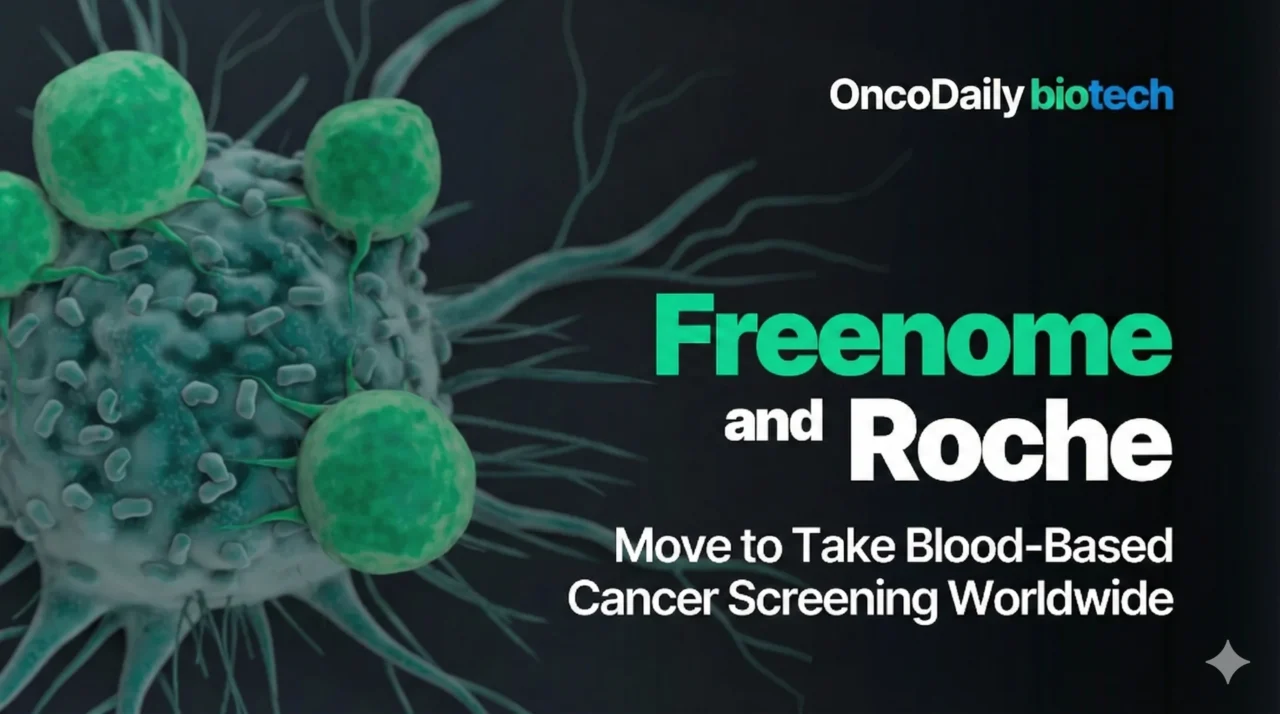According to freenome official website, Roche has signed an exclusive deal to help develop and commercialize Freenome’s blood-based cancer screening tests in markets outside the United States.
The agreement deepens a long-running collaboration between the Swiss diagnostics giant and the California-based early cancer detection company and adds a new, international layer to Freenome’s commercialization strategy just as its first test nears an FDA decision.
Roche gets exclusive ex-US “kit” rights
Under the new pact, Roche is obtaining exclusive rights to develop and market so-called “kitted” versions of Freenome’s cancer screening assays outside the U.S.
These kits bundle the assay and software so hospitals and labs can run the tests locally, instead of shipping samples to a single central laboratory. That model plays directly to Roche’s global installed base of analyzers and its long history in decentralized diagnostics, potentially making it easier for health systems in Europe and other regions to integrate Freenome’s tests into routine care.
Freenome, meanwhile, is keeping control over centralized testing outside the U.S. and retains all U.S. rights to its tests, subject to its separate license agreement with Exact Sciences..
Deal value tops $200 million — with $75M upfront
Financially, the collaboration could be worth more than $200 million to Freenome. Roche is making a new $75 million equity investment in the company as part of the deal, with the rest tied to development milestones and royalties on ex-U.S. sales of the tests.
The transaction also increases Roche’s ownership stake in Freenome. The Swiss group led a $254 million financing round for the company in 2024, signaling a long-term bet on blood-based cancer screening.

Sequencing shift: from Illumina to Roche SBX?
Today, Freenome’s multiomic blood tests run on Illumina sequencing platforms. The new agreement gives Freenome the option to evaluate Roche’s in-house Sequencing by Expansion (SBX) technology for future products.
SBX is Roche’s next-generation DNA reading method that blends features of DNA synthesis and nanopore-style detection to amplify the signal from each nucleotide. Roche sees SBX as a strategic technology for high-throughput clinical genomics, and the Freenome deal is one of the first major applications it has publicly linked to the platform.
Even so, analysts at Leerink Partners told clients they do not expect the agreement to have a material near- or medium-term impact on Illumina, suggesting Freenome’s move to SBX, if it happens, would be gradual.
Plugging into an expanding commercial plan
The Roche collaboration is the second major commercialization deal Freenome has announced in a matter of months.
In August, Exact Sciences agreed to pay $75 million upfront and up to $700 million in milestones for U.S. rights to Freenome’s colorectal cancer blood-based screening test — and potential future iterations — once they clear regulators. The total value of that deal could reach $885 million, and an FDA premarket approval decision on the first version of the test is expected in the second half of 2026.
Taken together, the Exact Sciences arrangement in the U.S. and the Roche kitted-test rights ex-U.S. give Freenome a hybrid commercial model:
- Central lab testing in the U.S. in partnership with Exact Sciences
- Decentralized “kitted” testing in many international markets with Roche
- Freenome-controlled centralized testing outside the U.S., layered on top of both deals
Multi-cancer ambitions and access to big plasma cohorts
While the colorectal screening assay is Freenome’s lead program, both companies are framing the collaboration in broader, multi-cancer terms.
Alongside kit development, Roche is providing access to large plasma sample cohorts from its global diagnostics network. Freenome plans to use those samples to accelerate development of personalized screening tests for multiple cancer types, including lung cancer.
Freenome already incorporates protein, cfDNA and other data layers into its “multiomic” blood tests. Roche’s Elecsys technology for protein and biomarker analysis is part of that stack today and will continue to be a key component under the new agreement.
Freenome CEO Aaron Elliott said the expanded partnership will help the company
“enhance [its] multiomic blood-based cancer screening platform and accelerate [its] test pipeline,”
while Roche executives have framed the deal as a high-impact use case for SBX and a way to scale blood-based early detection globally.

Strategic positioning in a crowded screening market
The deal underscores how quickly the cancer screening landscape is consolidating around a few large players with the scale to run global trials, secure reimbursement and deploy new technologies. Exact Sciences is already a leader in colorectal cancer screening; Illumina has long dominated clinical sequencing; and Abbott has announced plans to acquire Exact Sciences, potentially reshaping competitive dynamics further.
By aligning with both Roche and Exact Sciences, Freenome is positioning its tests as complementary rather than purely competitive — another option in a toolkit that includes stool DNA tests, colonoscopy and imaging. For Roche, the agreement offers a way to bolster its diagnostics portfolio with high-growth, blood-based screening tests that can be run on its analyzers and, eventually, on SBX.
How quickly that vision translates into routine clinical use will depend on regulatory outcomes, real-world performance data and health-system appetite for new screening paradigms. But with significant capital now committed on both sides of the Atlantic, Freenome’s transition from promising startup to global diagnostics partner is clearly underway.


